Psychosocial Development in Human Relationships and Life Transitions
VerifiedAdded on 2023/06/12
|7
|1696
|254
Report
AI Summary
This report provides an insightful analysis of psychosocial development, focusing on human relationships and life transitions. It identifies normative and non-normative examples of psychosocial development in children aged 2-5, referencing a case study of twin sons and their interactions with their mother. The report discusses the influence of cultural, social, and socioeconomic contexts on psychological development, highlighting the importance of genetics, language, social growth, and cognitive development. It also emphasizes the role of nursing professionals in supporting parenting and child development, suggesting that early childhood experiences significantly shape an individual's personality and behavior. The report concludes that each developmental stage is oriented toward different values and abilities, influencing personal growth and development throughout life.
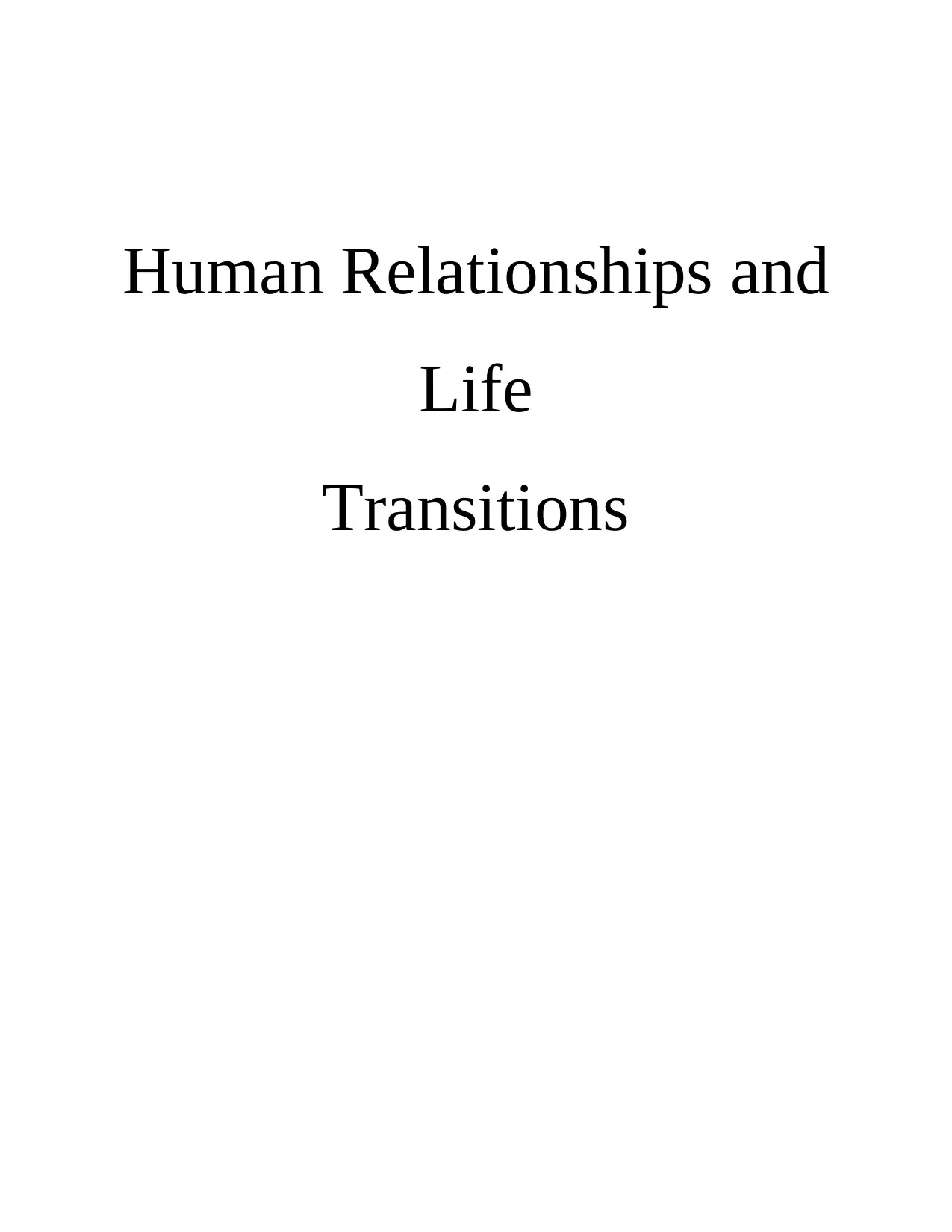
Human Relationships and
Life
Transitions
Life
Transitions
Paraphrase This Document
Need a fresh take? Get an instant paraphrase of this document with our AI Paraphraser
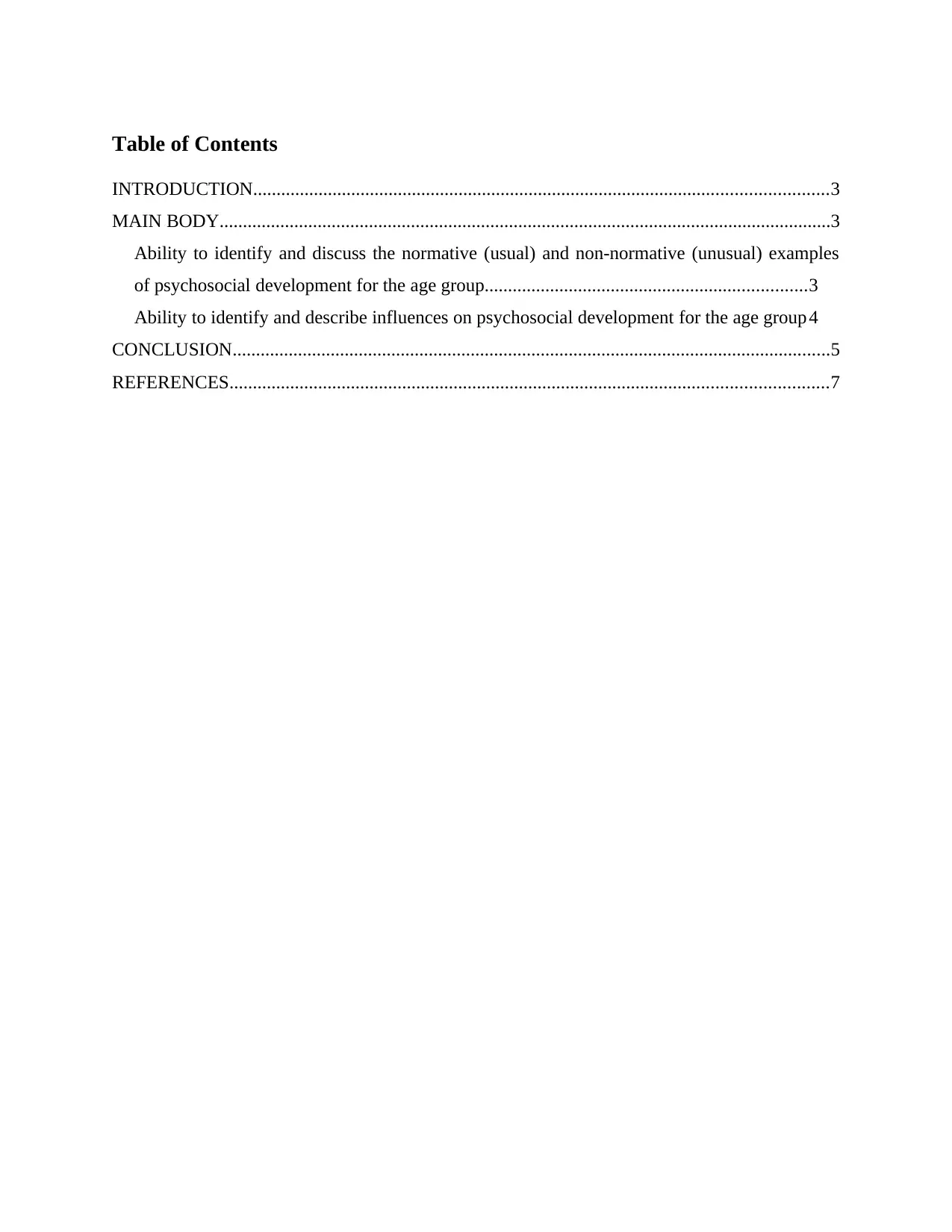
Table of Contents
INTRODUCTION...........................................................................................................................3
MAIN BODY...................................................................................................................................3
Ability to identify and discuss the normative (usual) and non-normative (unusual) examples
of psychosocial development for the age group.....................................................................3
Ability to identify and describe influences on psychosocial development for the age group 4
CONCLUSION................................................................................................................................5
REFERENCES................................................................................................................................7
INTRODUCTION...........................................................................................................................3
MAIN BODY...................................................................................................................................3
Ability to identify and discuss the normative (usual) and non-normative (unusual) examples
of psychosocial development for the age group.....................................................................3
Ability to identify and describe influences on psychosocial development for the age group 4
CONCLUSION................................................................................................................................5
REFERENCES................................................................................................................................7
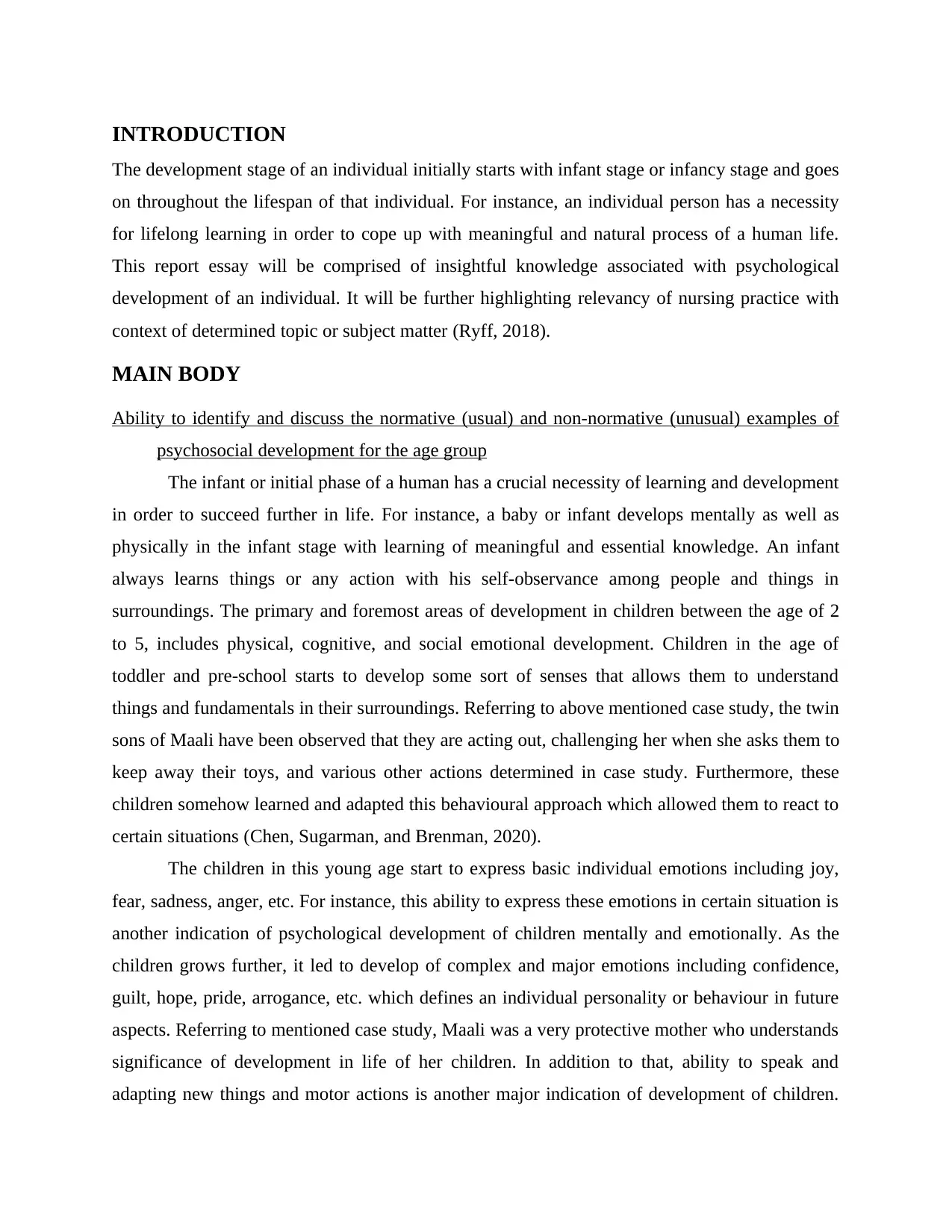
INTRODUCTION
The development stage of an individual initially starts with infant stage or infancy stage and goes
on throughout the lifespan of that individual. For instance, an individual person has a necessity
for lifelong learning in order to cope up with meaningful and natural process of a human life.
This report essay will be comprised of insightful knowledge associated with psychological
development of an individual. It will be further highlighting relevancy of nursing practice with
context of determined topic or subject matter (Ryff, 2018).
MAIN BODY
Ability to identify and discuss the normative (usual) and non-normative (unusual) examples of
psychosocial development for the age group
The infant or initial phase of a human has a crucial necessity of learning and development
in order to succeed further in life. For instance, a baby or infant develops mentally as well as
physically in the infant stage with learning of meaningful and essential knowledge. An infant
always learns things or any action with his self-observance among people and things in
surroundings. The primary and foremost areas of development in children between the age of 2
to 5, includes physical, cognitive, and social emotional development. Children in the age of
toddler and pre-school starts to develop some sort of senses that allows them to understand
things and fundamentals in their surroundings. Referring to above mentioned case study, the twin
sons of Maali have been observed that they are acting out, challenging her when she asks them to
keep away their toys, and various other actions determined in case study. Furthermore, these
children somehow learned and adapted this behavioural approach which allowed them to react to
certain situations (Chen, Sugarman, and Brenman, 2020).
The children in this young age start to express basic individual emotions including joy,
fear, sadness, anger, etc. For instance, this ability to express these emotions in certain situation is
another indication of psychological development of children mentally and emotionally. As the
children grows further, it led to develop of complex and major emotions including confidence,
guilt, hope, pride, arrogance, etc. which defines an individual personality or behaviour in future
aspects. Referring to mentioned case study, Maali was a very protective mother who understands
significance of development in life of her children. In addition to that, ability to speak and
adapting new things and motor actions is another major indication of development of children.
The development stage of an individual initially starts with infant stage or infancy stage and goes
on throughout the lifespan of that individual. For instance, an individual person has a necessity
for lifelong learning in order to cope up with meaningful and natural process of a human life.
This report essay will be comprised of insightful knowledge associated with psychological
development of an individual. It will be further highlighting relevancy of nursing practice with
context of determined topic or subject matter (Ryff, 2018).
MAIN BODY
Ability to identify and discuss the normative (usual) and non-normative (unusual) examples of
psychosocial development for the age group
The infant or initial phase of a human has a crucial necessity of learning and development
in order to succeed further in life. For instance, a baby or infant develops mentally as well as
physically in the infant stage with learning of meaningful and essential knowledge. An infant
always learns things or any action with his self-observance among people and things in
surroundings. The primary and foremost areas of development in children between the age of 2
to 5, includes physical, cognitive, and social emotional development. Children in the age of
toddler and pre-school starts to develop some sort of senses that allows them to understand
things and fundamentals in their surroundings. Referring to above mentioned case study, the twin
sons of Maali have been observed that they are acting out, challenging her when she asks them to
keep away their toys, and various other actions determined in case study. Furthermore, these
children somehow learned and adapted this behavioural approach which allowed them to react to
certain situations (Chen, Sugarman, and Brenman, 2020).
The children in this young age start to express basic individual emotions including joy,
fear, sadness, anger, etc. For instance, this ability to express these emotions in certain situation is
another indication of psychological development of children mentally and emotionally. As the
children grows further, it led to develop of complex and major emotions including confidence,
guilt, hope, pride, arrogance, etc. which defines an individual personality or behaviour in future
aspects. Referring to mentioned case study, Maali was a very protective mother who understands
significance of development in life of her children. In addition to that, ability to speak and
adapting new things and motor actions is another major indication of development of children.
⊘ This is a preview!⊘
Do you want full access?
Subscribe today to unlock all pages.

Trusted by 1+ million students worldwide
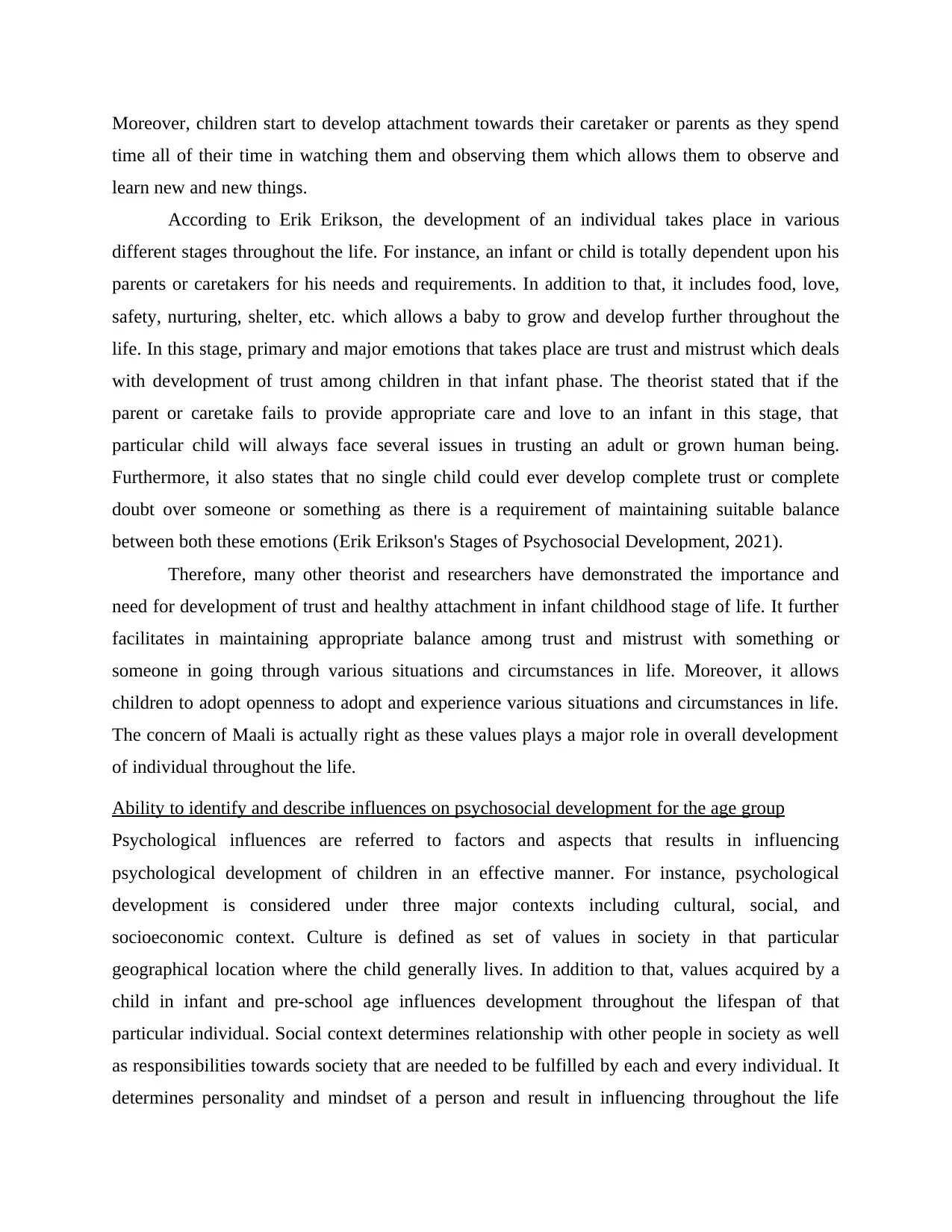
Moreover, children start to develop attachment towards their caretaker or parents as they spend
time all of their time in watching them and observing them which allows them to observe and
learn new and new things.
According to Erik Erikson, the development of an individual takes place in various
different stages throughout the life. For instance, an infant or child is totally dependent upon his
parents or caretakers for his needs and requirements. In addition to that, it includes food, love,
safety, nurturing, shelter, etc. which allows a baby to grow and develop further throughout the
life. In this stage, primary and major emotions that takes place are trust and mistrust which deals
with development of trust among children in that infant phase. The theorist stated that if the
parent or caretake fails to provide appropriate care and love to an infant in this stage, that
particular child will always face several issues in trusting an adult or grown human being.
Furthermore, it also states that no single child could ever develop complete trust or complete
doubt over someone or something as there is a requirement of maintaining suitable balance
between both these emotions (Erik Erikson's Stages of Psychosocial Development, 2021).
Therefore, many other theorist and researchers have demonstrated the importance and
need for development of trust and healthy attachment in infant childhood stage of life. It further
facilitates in maintaining appropriate balance among trust and mistrust with something or
someone in going through various situations and circumstances in life. Moreover, it allows
children to adopt openness to adopt and experience various situations and circumstances in life.
The concern of Maali is actually right as these values plays a major role in overall development
of individual throughout the life.
Ability to identify and describe influences on psychosocial development for the age group
Psychological influences are referred to factors and aspects that results in influencing
psychological development of children in an effective manner. For instance, psychological
development is considered under three major contexts including cultural, social, and
socioeconomic context. Culture is defined as set of values in society in that particular
geographical location where the child generally lives. In addition to that, values acquired by a
child in infant and pre-school age influences development throughout the lifespan of that
particular individual. Social context determines relationship with other people in society as well
as responsibilities towards society that are needed to be fulfilled by each and every individual. It
determines personality and mindset of a person and result in influencing throughout the life
time all of their time in watching them and observing them which allows them to observe and
learn new and new things.
According to Erik Erikson, the development of an individual takes place in various
different stages throughout the life. For instance, an infant or child is totally dependent upon his
parents or caretakers for his needs and requirements. In addition to that, it includes food, love,
safety, nurturing, shelter, etc. which allows a baby to grow and develop further throughout the
life. In this stage, primary and major emotions that takes place are trust and mistrust which deals
with development of trust among children in that infant phase. The theorist stated that if the
parent or caretake fails to provide appropriate care and love to an infant in this stage, that
particular child will always face several issues in trusting an adult or grown human being.
Furthermore, it also states that no single child could ever develop complete trust or complete
doubt over someone or something as there is a requirement of maintaining suitable balance
between both these emotions (Erik Erikson's Stages of Psychosocial Development, 2021).
Therefore, many other theorist and researchers have demonstrated the importance and
need for development of trust and healthy attachment in infant childhood stage of life. It further
facilitates in maintaining appropriate balance among trust and mistrust with something or
someone in going through various situations and circumstances in life. Moreover, it allows
children to adopt openness to adopt and experience various situations and circumstances in life.
The concern of Maali is actually right as these values plays a major role in overall development
of individual throughout the life.
Ability to identify and describe influences on psychosocial development for the age group
Psychological influences are referred to factors and aspects that results in influencing
psychological development of children in an effective manner. For instance, psychological
development is considered under three major contexts including cultural, social, and
socioeconomic context. Culture is defined as set of values in society in that particular
geographical location where the child generally lives. In addition to that, values acquired by a
child in infant and pre-school age influences development throughout the lifespan of that
particular individual. Social context determines relationship with other people in society as well
as responsibilities towards society that are needed to be fulfilled by each and every individual. It
determines personality and mindset of a person and result in influencing throughout the life
Paraphrase This Document
Need a fresh take? Get an instant paraphrase of this document with our AI Paraphraser
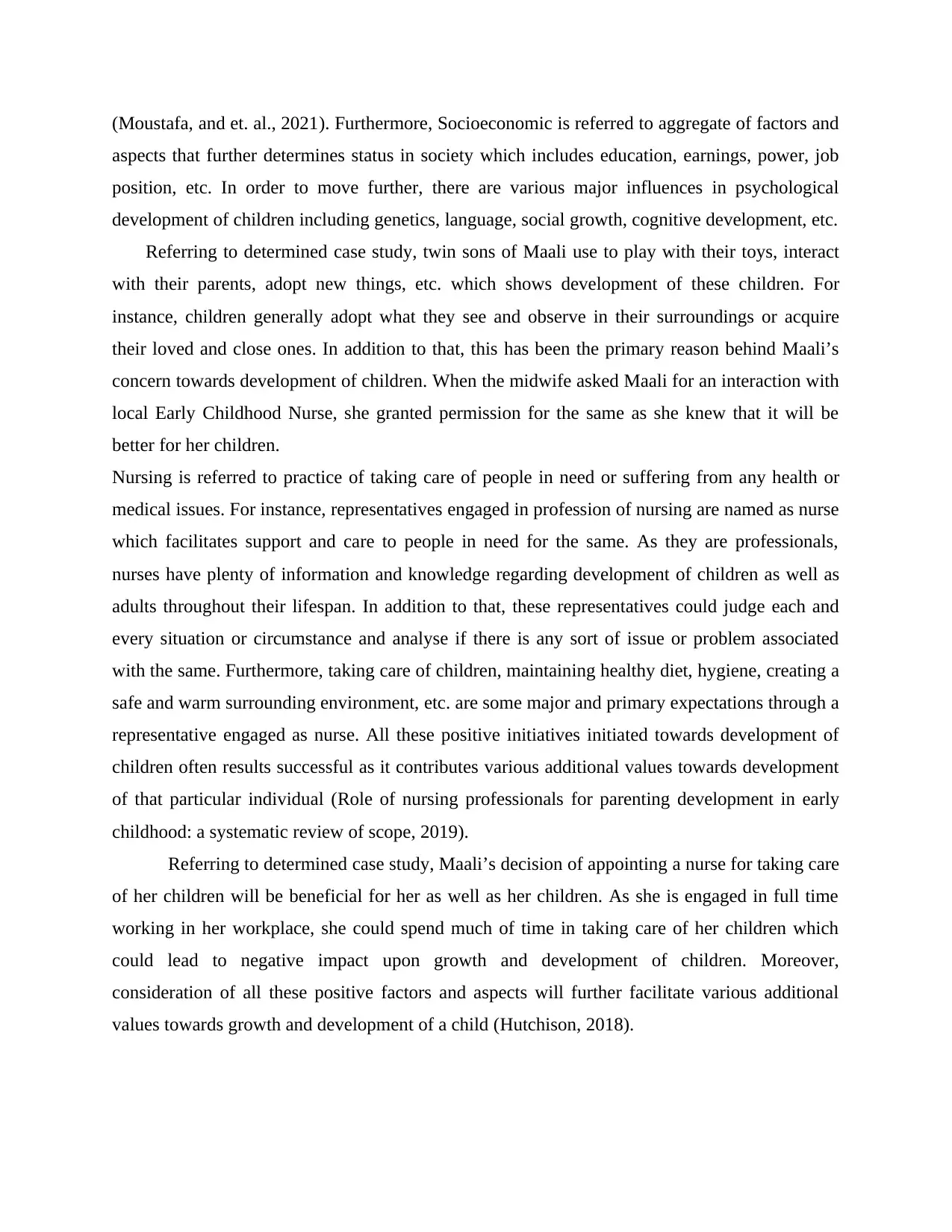
(Moustafa, and et. al., 2021). Furthermore, Socioeconomic is referred to aggregate of factors and
aspects that further determines status in society which includes education, earnings, power, job
position, etc. In order to move further, there are various major influences in psychological
development of children including genetics, language, social growth, cognitive development, etc.
Referring to determined case study, twin sons of Maali use to play with their toys, interact
with their parents, adopt new things, etc. which shows development of these children. For
instance, children generally adopt what they see and observe in their surroundings or acquire
their loved and close ones. In addition to that, this has been the primary reason behind Maali’s
concern towards development of children. When the midwife asked Maali for an interaction with
local Early Childhood Nurse, she granted permission for the same as she knew that it will be
better for her children.
Nursing is referred to practice of taking care of people in need or suffering from any health or
medical issues. For instance, representatives engaged in profession of nursing are named as nurse
which facilitates support and care to people in need for the same. As they are professionals,
nurses have plenty of information and knowledge regarding development of children as well as
adults throughout their lifespan. In addition to that, these representatives could judge each and
every situation or circumstance and analyse if there is any sort of issue or problem associated
with the same. Furthermore, taking care of children, maintaining healthy diet, hygiene, creating a
safe and warm surrounding environment, etc. are some major and primary expectations through a
representative engaged as nurse. All these positive initiatives initiated towards development of
children often results successful as it contributes various additional values towards development
of that particular individual (Role of nursing professionals for parenting development in early
childhood: a systematic review of scope, 2019).
Referring to determined case study, Maali’s decision of appointing a nurse for taking care
of her children will be beneficial for her as well as her children. As she is engaged in full time
working in her workplace, she could spend much of time in taking care of her children which
could lead to negative impact upon growth and development of children. Moreover,
consideration of all these positive factors and aspects will further facilitate various additional
values towards growth and development of a child (Hutchison, 2018).
aspects that further determines status in society which includes education, earnings, power, job
position, etc. In order to move further, there are various major influences in psychological
development of children including genetics, language, social growth, cognitive development, etc.
Referring to determined case study, twin sons of Maali use to play with their toys, interact
with their parents, adopt new things, etc. which shows development of these children. For
instance, children generally adopt what they see and observe in their surroundings or acquire
their loved and close ones. In addition to that, this has been the primary reason behind Maali’s
concern towards development of children. When the midwife asked Maali for an interaction with
local Early Childhood Nurse, she granted permission for the same as she knew that it will be
better for her children.
Nursing is referred to practice of taking care of people in need or suffering from any health or
medical issues. For instance, representatives engaged in profession of nursing are named as nurse
which facilitates support and care to people in need for the same. As they are professionals,
nurses have plenty of information and knowledge regarding development of children as well as
adults throughout their lifespan. In addition to that, these representatives could judge each and
every situation or circumstance and analyse if there is any sort of issue or problem associated
with the same. Furthermore, taking care of children, maintaining healthy diet, hygiene, creating a
safe and warm surrounding environment, etc. are some major and primary expectations through a
representative engaged as nurse. All these positive initiatives initiated towards development of
children often results successful as it contributes various additional values towards development
of that particular individual (Role of nursing professionals for parenting development in early
childhood: a systematic review of scope, 2019).
Referring to determined case study, Maali’s decision of appointing a nurse for taking care
of her children will be beneficial for her as well as her children. As she is engaged in full time
working in her workplace, she could spend much of time in taking care of her children which
could lead to negative impact upon growth and development of children. Moreover,
consideration of all these positive factors and aspects will further facilitate various additional
values towards growth and development of a child (Hutchison, 2018).
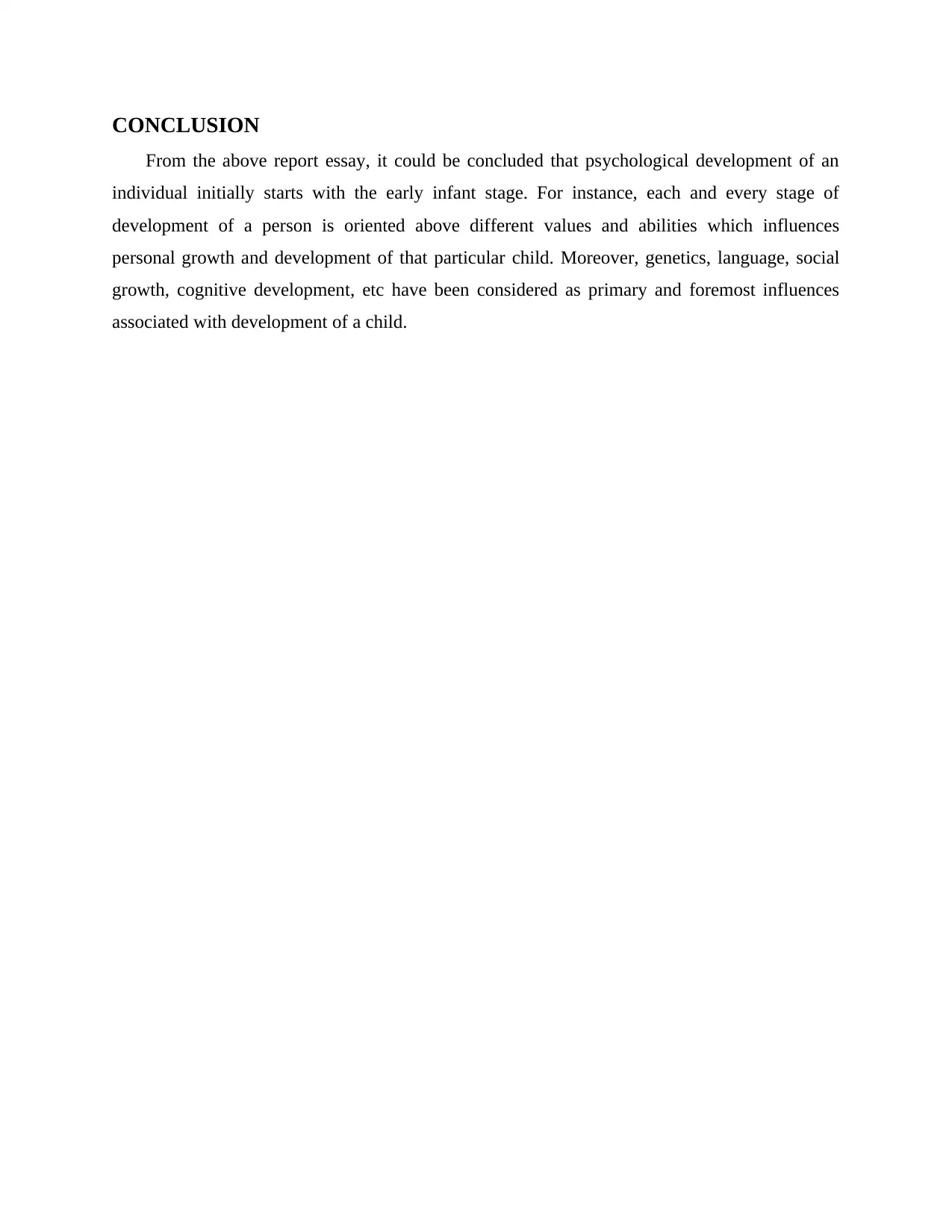
CONCLUSION
From the above report essay, it could be concluded that psychological development of an
individual initially starts with the early infant stage. For instance, each and every stage of
development of a person is oriented above different values and abilities which influences
personal growth and development of that particular child. Moreover, genetics, language, social
growth, cognitive development, etc have been considered as primary and foremost influences
associated with development of a child.
From the above report essay, it could be concluded that psychological development of an
individual initially starts with the early infant stage. For instance, each and every stage of
development of a person is oriented above different values and abilities which influences
personal growth and development of that particular child. Moreover, genetics, language, social
growth, cognitive development, etc have been considered as primary and foremost influences
associated with development of a child.
⊘ This is a preview!⊘
Do you want full access?
Subscribe today to unlock all pages.

Trusted by 1+ million students worldwide
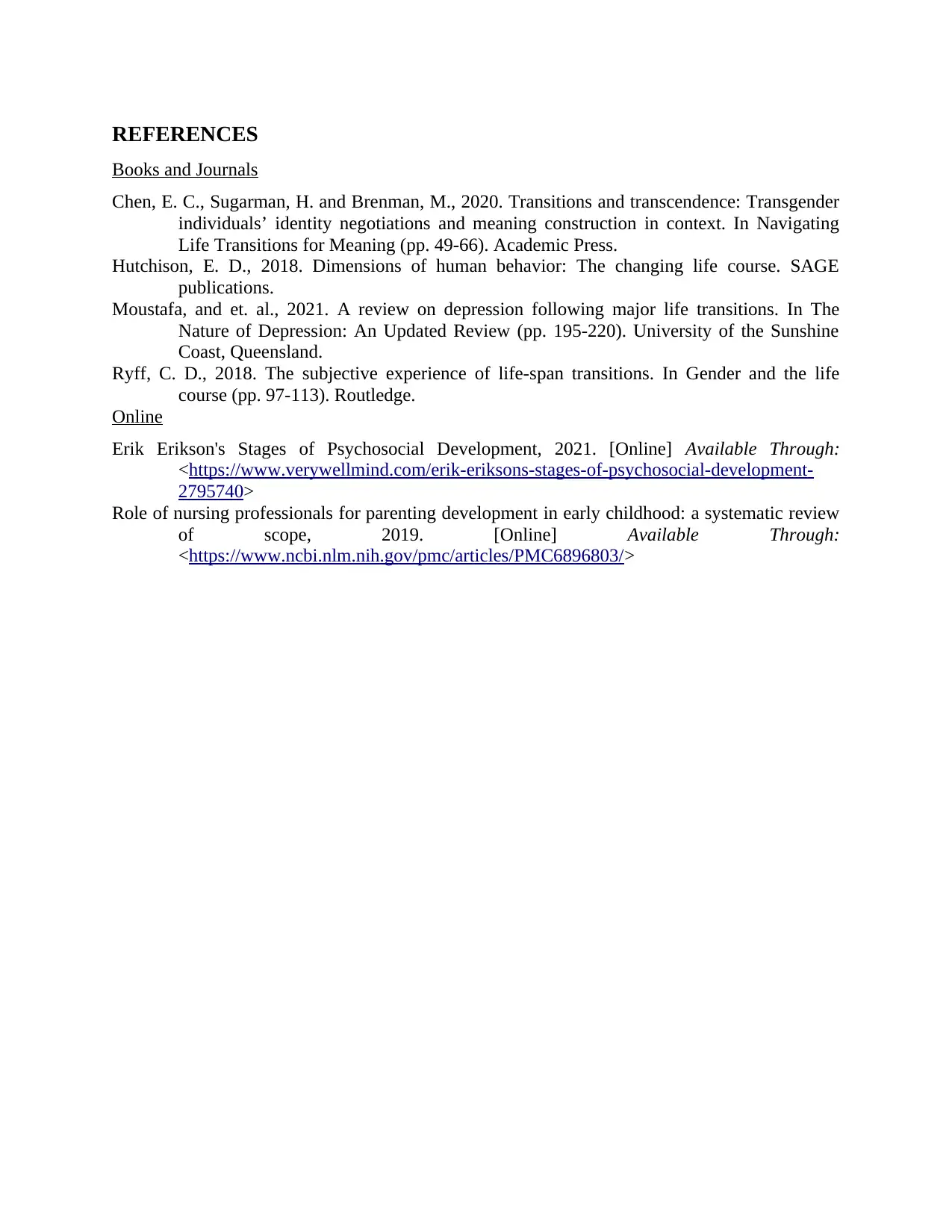
REFERENCES
Books and Journals
Chen, E. C., Sugarman, H. and Brenman, M., 2020. Transitions and transcendence: Transgender
individuals’ identity negotiations and meaning construction in context. In Navigating
Life Transitions for Meaning (pp. 49-66). Academic Press.
Hutchison, E. D., 2018. Dimensions of human behavior: The changing life course. SAGE
publications.
Moustafa, and et. al., 2021. A review on depression following major life transitions. In The
Nature of Depression: An Updated Review (pp. 195-220). University of the Sunshine
Coast, Queensland.
Ryff, C. D., 2018. The subjective experience of life-span transitions. In Gender and the life
course (pp. 97-113). Routledge.
Online
Erik Erikson's Stages of Psychosocial Development, 2021. [Online] Available Through:
<https://www.verywellmind.com/erik-eriksons-stages-of-psychosocial-development-
2795740>
Role of nursing professionals for parenting development in early childhood: a systematic review
of scope, 2019. [Online] Available Through:
<https://www.ncbi.nlm.nih.gov/pmc/articles/PMC6896803/>
Books and Journals
Chen, E. C., Sugarman, H. and Brenman, M., 2020. Transitions and transcendence: Transgender
individuals’ identity negotiations and meaning construction in context. In Navigating
Life Transitions for Meaning (pp. 49-66). Academic Press.
Hutchison, E. D., 2018. Dimensions of human behavior: The changing life course. SAGE
publications.
Moustafa, and et. al., 2021. A review on depression following major life transitions. In The
Nature of Depression: An Updated Review (pp. 195-220). University of the Sunshine
Coast, Queensland.
Ryff, C. D., 2018. The subjective experience of life-span transitions. In Gender and the life
course (pp. 97-113). Routledge.
Online
Erik Erikson's Stages of Psychosocial Development, 2021. [Online] Available Through:
<https://www.verywellmind.com/erik-eriksons-stages-of-psychosocial-development-
2795740>
Role of nursing professionals for parenting development in early childhood: a systematic review
of scope, 2019. [Online] Available Through:
<https://www.ncbi.nlm.nih.gov/pmc/articles/PMC6896803/>
1 out of 7
Related Documents
Your All-in-One AI-Powered Toolkit for Academic Success.
+13062052269
info@desklib.com
Available 24*7 on WhatsApp / Email
![[object Object]](/_next/static/media/star-bottom.7253800d.svg)
Unlock your academic potential
Copyright © 2020–2025 A2Z Services. All Rights Reserved. Developed and managed by ZUCOL.





